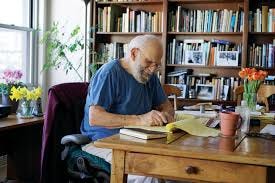Finding Beauty in Life’s Endings: A Review of "Gratitude" by Oliver Sacks
Views & Reviews: essays and book reviews
Gratitude, which can be read in less than an hour, is a moving and deeply reflective collection of essays written by Oliver Sacks during the final months of his life. Published posthumously in 2015, this slim yet profound book comprises four essays: Mercury, My Own Life, My Periodic Table, and Sabbath. Each essay serves as a meditation on life, mortality, and, above all, gratitude for the richness of existence, even in its final moments.
Oliver Sacks, a renowned neurologist and prolific author, was known for his ability to humanize science and explore the complexity of the human brain. Born in London in 1933 to a family of medical professionals, Sacks went on to study medicine at Oxford University before moving to the United States. His groundbreaking work as a neurologist made him not only a respected physician but also a beloved storyteller. Sacks was famous for his unique blend of scientific rigor and empathy, bringing to life the experiences of patients with neurological disorders. Books such as Awakenings (1973), The Man Who Mistook His Wife for a Hat (1985), and An Anthropologist on Mars (1995) cemented his reputation as a gifted writer who could bridge the gap between science and literature.
In Gratitude, Sacks turns his focus inward, reflecting on his life as he grapples with terminal cancer. The essays are intimate and deeply personal, yet they resonate universally, as they examine themes of time, fulfillment, and the acceptance of death. Sacks’ reflections on the beauty of life are tinged with both melancholy and celebration, creating a sense of peace that lingers long after the book has been read.
The opening essay, Mercury, sets the tone for the book. Sacks uses the metaphor of the planet Mercury—swift-moving and unpredictable—to reflect on his own life, which he describes as one filled with movement, exploration, and wonder. He recalls his passions for swimming, writing, and scientific inquiry, marveling at how these pursuits have provided him with meaning and fulfillment. There is no bitterness here, only a profound sense of gratitude for the life he has lived. Sacks acknowledges that his time is short, but his focus remains on what has been gained rather than what will be lost.
My Own Life, perhaps the most poignant essay, serves as a direct confrontation with Sacks’ impending death. Inspired by philosopher David Hume’s reflections on mortality, Sacks similarly catalogs his life’s achievements and regrets with humility and acceptance. He writes, “I have loved and been loved; I have been given much and I have given something in return.” Sacks’ candid tone conveys a rare authenticity, as he meditates on the privilege of having experienced so much in his 82 years. Because I will soon enter my ninth decade, this essay had special meaning for me. When death approaches my doorstep, I know that reading and then rereading this exceptionally profound essay will provide me with a deep sense of gratitude for the life I have lived.
In My Periodic Table, Sacks reflects on his lifelong fascination with the periodic table of elements, using it as a metaphor to convey his enduring sense of curiosity about the world. He describes how, even in his final days, the elements continue to inspire a sense of order and connection to the universe. This essay is particularly beautiful in its exploration of Sacks’ scientific mind and his reverence for the natural world.
The book closes with Sabbath, a reflective and somewhat spiritual essay that explores Sacks’ Jewish upbringing and his complex relationship with religion. He recalls how his observant Jewish family celebrated the Sabbath as a day of rest and joy, contrasting it with his own rejection of religious orthodoxy in adulthood. Yet, as he faces death, Sacks finds a renewed sense of comfort in the rituals and traditions of his childhood. In this essay, readers see a reconciliation between the secular and the sacred, as Sacks embraces the quiet beauty of the Sabbath as a metaphor for life’s final moments.
What makes Gratitude so compelling is Sacks’ unwavering honesty and his ability to confront mortality with grace and dignity. He does not shy away from his fear of death, nor does he minimize the sadness of leaving life behind. Yet his reflections are imbued with a profound sense of appreciation for the world he has inhabited. Sacks writes with a clarity and precision that make his insights all the more powerful, and his love for life—for science, for writing, for the natural world—is palpable on every page.
Stylistically, Gratitude is both poetic and concise. Each essay feels like a carefully polished gem, reflecting Sacks’ meticulous approach to language. His prose is elegant but never pretentious, and his observations are both deeply personal and universally resonant. There is a timeless quality to Sacks’ writing that ensures his reflections will continue to inspire readers for generations to come.
In Gratitude, Oliver Sacks leaves us with a profound lesson: that life, even in its final moments, is a gift to be cherished. He reminds us that gratitude is not simply about acknowledging the good things in life but also about embracing the full spectrum of human experience, including its sorrows and endings. Sacks’ reflections invite us to live more fully, to appreciate the beauty in small moments, and to confront mortality with courage and grace.
While Gratitude is often associated with older readers reflecting on their lives, it holds equal significance for younger audiences. For younger readers, the book offers a chance to consider life’s fragility and the importance of living intentionally. Sacks’ reflections remind them to embrace curiosity, cherish relationships, and find meaning in the present. By contemplating the inevitability of endings, even at an earlier stage of life, young people may be inspired to cultivate gratitude and a deeper awareness of their own journeys. The book’s universal themes make it a valuable guide for anyone seeking to live a life of purpose and mindfulness, regardless of age.
Ultimately, Gratitude is not just a farewell; it is a celebration of a life well-lived. Through these essays, Oliver Sacks continues to teach us how to face life and death with humility, curiosity, and, most importantly, gratitude. His words are a testament to the power of reflection and the enduring beauty of the human spirit. Gratitude serves as a fitting and deeply moving conclusion to his remarkable literary and scientific legacy.
(The author received a B.A. degree in Philosophy from The Johns Hopkins University.)







What a wonderful review. I recommend the book to my grievers. To remember gratitude for their life and gratitude of their loved ones life.
Thank You.
This is a lovely review. I have read quite a bit of Sacks, but not this one. I look forward to reading it. Thanks.